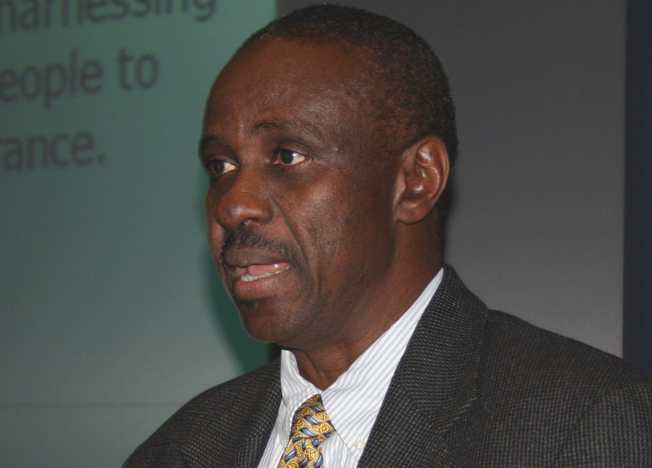Cheikh Mbacké (Photo Credit: The National Academy of Sciences, licensed under CC BY 2.0)
Through their path-breaking work and sheer force of personality, some individuals shape whole fields in the most positive ways. Cheikh Mbacké is one of those people. His influence on population research in Africa is deep and long-lasting—and now fully recognized by his peers with the Laureate Award of the International Union for the Scientific Study of Population, which he received at a ceremony earlier this week. He’s been a great friend to the Hewlett Foundation’s Global Development and Population Program and it’s a privilege to take a moment to recognize his contributions.
Here’s a quick but incomplete summary of Cheikh’s career: Born and raised in Nioro, Senegal, Cheikh earned a bachelor’s degree in statistics from the Institut National de la Statistique et des Études Économiques in Paris, a master’s degree in demography from the Institut de Formation et de Recherche Démographique in Yaoundé, Cameroon, and a doctoral degree in demography from the University of Pennsylvania.
As a young researcher, Cheikh charted new data collection paths from the start. Early in his career, he worked on the first Senegalese census and on a pilot survey of nomadic peoples in Mauritania as part of the first Mauritanian census. This was the Wild West (Africa) of demography. He then joined the Center for Applied Studies and Research on Population and Development at the Sahel Institute in Bamako, Mali, where he led the training division and, many report, was also the Center’s most productive researcher. He helped to create the first demographic surveillance sites in Africa – sites that gather information over time on the same people, permitting analyses that no cross-sectional surveys ever can.
Cheikh then joined the Rockefeller Foundation as senior scientist in the Population Sciences division, and then the foundation’s representative for Africa, using his ability as a funder to support the expansion of demographic training and surveillance sites. Later, he became a vice president at Rockefeller, a position he held until the mid-2000s when he decided that he wanted to return both to Senegal and to the field of study that he loves.
Since 2006, Cheikh has been a senior advisor to the Hewlett Foundation, helping us improve the training of African population scientists and increase the availability of population and reproductive health data. He’s been our colleague in strategy development, our eyes and ears in the field, and a source of encouragement and guidance to people in organizations we support to carry out the crucial work of data collection, analysis, and demographic training.
The impact of his work is legion. Almost every African demographer, and many population scientists from other regions, can trace a pivotal moment in their own careers to advice, support, ideas, and constructive critique offered by Cheikh Mbacké. As a key advisor to us over many years, and through his earlier work at Rockefeller, Cheikh has influenced important funding decisions with his knowledge and imagination; hundreds of researchers and trainees have benefited, and key institutions have become stronger.
Through his service on several institutional boards, Cheikh has helped to ensure that there are homes in Africa for talented researchers who are committed to excellence. He has enabled many other African population scientists to excel in their own work, and to build key institutions like the INDEPTH network of demographic surveillance sites, the African Population and Health Research Center, and the Institut Supérieur des Sciences de la Population in Ouagadougou, Burkina Faso.
The letter nominating him for the award sums it up: “Cheikh Mbacké is, without doubt, the scientist who has done the most to create and sustain an African population research community . . . [H]e has been the key to the renewed commitment and growth of African population training institutes, a legacy that will continue to produce dividends for generations to come.”
But a mere accouting of his work tells only part of the story. Cheikh is a man who not only holds himself to high scientific standards, but also to the highest standards of respect and good will in every interaction, every relationship. Each day, he teaches a master class in how to demand excellence—just impatiently enough—while maintaining humility and an easy laugh. Again, quoting from the nomination letter: “Cheikh Mbacké is foremost among demographers who have contributed to the explosion of research in the area of policies linking population and health. His triple culture, first African but also European and American, makes him the ideal navigator for linking population researchers of multiple cultures, both Anglophone and Francophone, too often separated by linguistic barriers. Perhaps it is this triple culture which makes him so very attentive to those he meets, so constructive in his opinions and evaluations. Surely, his attentiveness also reflects his own professional rigor, mixed with his very evident humanity, modesty, and sense of humor. However these have come together, they have made Cheikh Mbacké a well-loved and much respected leader.”
We’ve been tremendously lucky to have been able to work with and learn from Cheikh, and look forward to many more opportunities in the years ahead.

